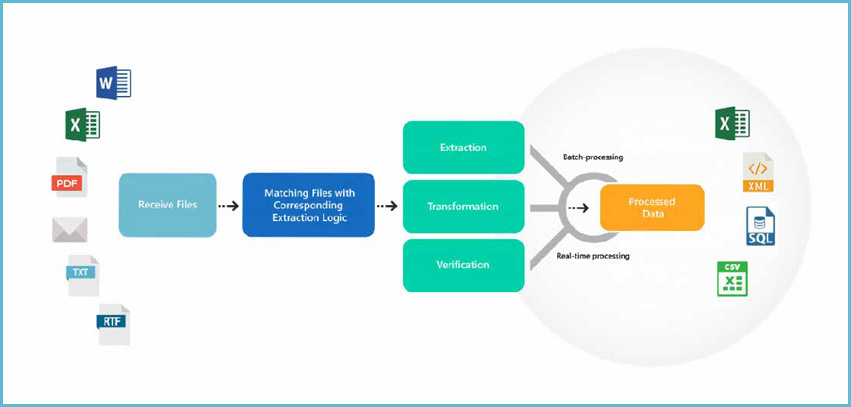How You Can Bring Accuracy and Security When You Outsource Data Extraction Services

In today’s data-driven world, companies handle vast amounts of data daily. Extracting and processing this data accurately and securely is crucial, especially for businesses that rely on critical information for decision-making. However, managing data extraction in-house can be resource-intensive and challenging. This is where the option to outsource data extraction services becomes invaluable. By outsourcing, companies can focus on core operations while ensuring that data extraction is handled professionally. Here’s how you can ensure accuracy and security when outsourcing data extraction services.
1. Choose an Experienced Provider
Accuracy in data extraction starts with selecting the right provider. Look for a service provider with a proven track record and experience in data extraction across industries. Experienced providers understand the nuances of extracting data from diverse sources and use specialized tools and best practices to ensure high accuracy rates.
Key Tip: Ask for case studies or references from previous clients to gauge the provider’s experience level and ability to handle data accurately.
2. Implement Clear Data Validation Protocols
When you outsource, ensure the provider follows strict data validation protocols. Validation protocols include processes that verify data against established standards, ensuring consistency and reducing errors. These protocols help prevent issues like missing or incorrect data, which can lead to inaccurate insights.
Key Tip: Work with the provider to establish a data validation process tailored to your specific needs, including regular quality checks throughout the data extraction process.
3. Use Advanced Extraction Tools
Providers that use advanced tools and software for data extraction can significantly improve both accuracy and security. These tools leverage automation, machine learning, and artificial intelligence to extract data precisely while minimizing human errors. They also offer encryption and security features, protecting sensitive information during the extraction process.
Key Tip: Confirm that the provider uses up-to-date and reliable data extraction tools and discuss any security features they employ, such as data encryption, secure APIs, and role-based access.
4. Ensure Compliance with Data Privacy Laws
Security is a major concern when you outsource data extraction, especially if you are handling personal or sensitive information. To protect your data and remain compliant, ensure the provider adheres to relevant data privacy laws like the GDPR, CCPA, and other regulations that govern data handling.
Key Tip: Ask the provider about their data privacy policies and protocols. Ensure they have measures in place to maintain compliance with industry standards and legal requirements.
5. Establish Secure Data Transfer Methods
Data security starts with secure data transfer methods. When sharing data with your service provider, using secure data transfer methods such as encrypted email, secure FTP, or cloud-based sharing platforms is crucial. These methods protect your data from unauthorized access during the transfer process.
Key Tip: Work with the provider to establish secure transfer protocols that align with your company’s security standards. Ensure that all data exchanges are encrypted and protected from potential breaches.
6. Set Up Access Controls
Access control measures limit who can view and handle your data within the provider’s organization. By setting up role-based access controls, you can restrict access to sensitive information, ensuring that only authorized personnel can handle your data. This not only enhances security but also helps maintain the integrity of the extracted data.
Key Tip: Ensure the provider has a robust access control policy. Ask them to specify who will have access to your data and how they manage permissions within their system.
7. Conduct Regular Quality Audits
Quality audits provide a way to continually assess the accuracy and security of the data extraction services. These audits involve reviewing samples of extracted data to verify accuracy and security compliance. By conducting regular audits, you can catch and address any errors or security issues early.
Key Tip: Set up a schedule for periodic audits with your provider. Work together to identify quality metrics that align with your business objectives, ensuring that all extracted data meets your standards.
8. Maintain Open Communication and Clear Expectations
Clear communication is essential to ensuring that your data extraction is both accurate and secure. Work closely with your service provider to define your requirements, including specific data formats, extraction timelines, and security expectations. Regular check-ins with the provider can help you stay informed about the process and address any concerns immediately.
Key Tip: Establish a dedicated point of contact within the provider’s organization for consistent communication. This will help resolve issues quickly and ensure that the provider understands your priorities and standards.
Conclusion
When you outsource data extraction services, you gain access to skilled professionals who can ensure accurate, secure, and efficient data extraction. However, achieving accuracy and security requires careful planning and collaboration with your provider. By following these strategies—choosing experienced providers, implementing validation protocols, securing data transfer methods, and conducting regular audits—you can protect your data and enjoy the benefits of outsourcing without compromising quality or security.
Outsourcing data extraction is a strategic decision that, when done right, can enhance your data management processes, improve operational efficiency, and free up your team to focus on other high-priority tasks
Recent Posts
- Vedanta Zambia Revives Copper Mining While Strengthening Economic Ties
- Essar Merino Laminates Teams up with Green Line to Achieve Sustainability in the Laminate Sector
- Hire Bspoqe Associates for Indian Style Small Modular Kitchen Design
- Empowering Financial Success: Jamie McIntyre’s Contributions to Bali
- 24/7 Support for Premature Babies and New Mothers in Delhi NCR
Recent Comments

How You Can Bring Accuracy and Security When You Outsource Data Extraction Services

63 moons - The success story called ‘innovation in the fin-tech arena’

Indian Automotive Industry Embraces Electric Vehicles for a Sustainable Future

6 Simple & Effective Ways to Nurture Your Customer Relationships

Vedanta Zambia Revives Copper Mining While Strengthening Economic Ties

Essar Merino Laminates Teams up with Green Line to Achieve Sustainability in the Laminate Sector

Hire Bspoqe Associates for Indian Style Small Modular Kitchen Design

